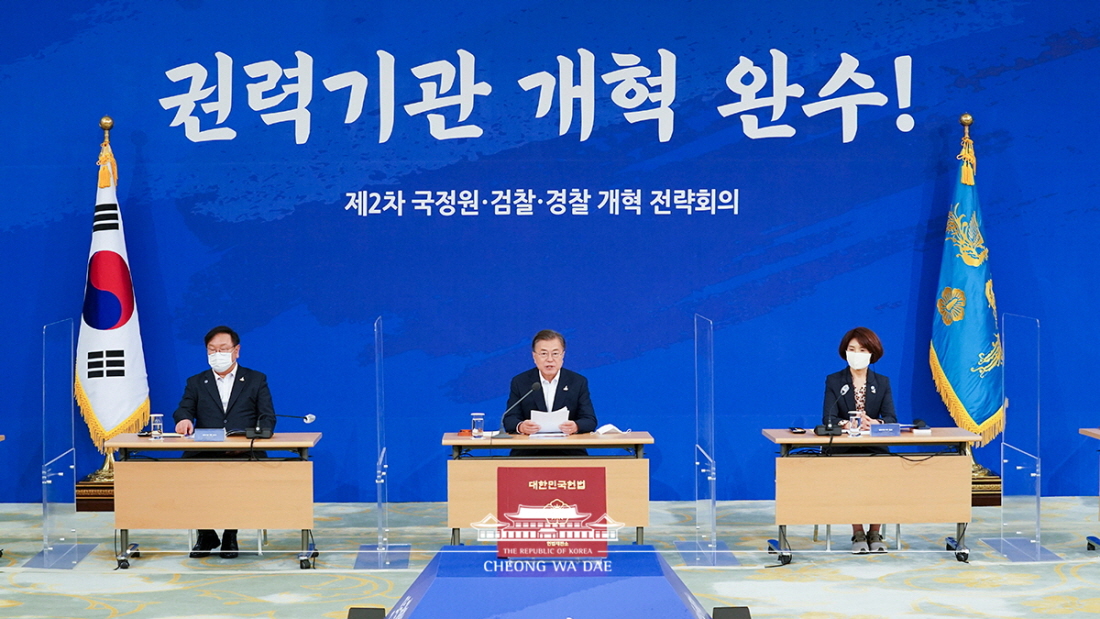이 웹사이트는 제19대 대통령 임기 종료에 따라 대통령기록관이 「대통령기록물 관리에 관한 법률」에 의해 이관받아 서비스하는 대통령기록물입니다. 자료의 열람만 가능하며 수정 · 추가 · 삭제는 불가능합니다.
다만, 「개인정보보호법」에 의하여 개인의 정보를 보호받기 원하시는 분은 관련 내용(요청자, 요청내용, 연락처, 글위치)을 대통령 웹기록물 담당자(044-211-2253)에게 요청해 주시면 신속히 검토하여 조치해 드리겠습니다. 감사합니다.
SPEECHES & REMARKS
BRIEFINGS
Remarks by President Moon Jae-in at 2nd Strategy Meeting on Reforming National Intelligence Service, Prosecution and Police

During the process of surmounting the COVID-19 pandemic, the police, the prosecution and the National Intelligence Service have been doing everything possible. The police and the prosecution have established a collaborative system with local governments and have been preemptively responding to COVID-19 by showing initiative in the course of their administrative duties. Based on a zero-tolerance principle, they have been stringently dealing with unlawful acts and any behavior that impedes epidemic prevention and control.
From the early stages of the COVID-19 outbreak, the NIS has been monitoring other countries’ pandemic updates and responses while actively safeguarding the Korean expatriates there. The agency has also been working hard to protect the public from financial fraud that exploits the crisis, including voice phishing and smishing. The people must be sensing how our law enforcement authorities have changed from what they once were. I highly appreciate your hard work in protecting the everyday lives of the people as you lead the efforts to reform your agencies on your own.
Rather than fine-tuning and reallocating authority among law enforcement agencies, or partially revising laws and systems, we have been pushing reform so far with a determination that these agencies be reborn to serve the people. Now we must redouble our efforts to complete the work remaining.
It is remarkable that the prosecution and the police have come together and put in place rules intended to guarantee human rights. Going forward, they need to establish an atmosphere that encourages investigations that respect human rights without diminishing the overall investigative capabilities of the country. The pace of reforming investigative power is picking up thanks to efforts by the ruling party, the Government and Cheong Wa Dae. I urge everyone to successfully complete this work without letting your guard down until it is fully accomplished.
The National Headquarters for Investigations has to be planned in a very meticulous manner to enhance the police’s independence and investigative capabilities. It must be launched after impeccable preparation so that the people come to trust police-led investigations. In line with the implementation of an autonomous local police system, the police also have to ensure that a policing system based on the principle of decentralization takes root. This is a new attempt to establish command and supervisory systems by clearly separating the duties of the national police and the autonomous local police. I urge you to engage in close consultations with relevant agencies and municipal and provincial governments. The systematic execution of duties by national and autonomous local police forces is imperative for the people.
As an agency specializing in North Korea-related and overseas intelligence, the NIS will have to realign its organization and personnel so that it can concentrate its capabilities only on the security of the people and the nation. The NIS’s status has risen under my Administration, confirming the fact that it can win the public’s trust and its staff’s pride can increase only when they remain faithful to carrying out their duties.
Our reform of law enforcement agencies is making an irreversible progress. Concerning matters that require legislation, we now need to closely cooperate with the National Assembly, and we also must work to implement what has been made into laws as soon as possible. Two huge legislative tasks remain: revising the Police Act and the NIS Korea Act. If law enforcement agencies can cooperate in a systematic manner while maintaining checks and balances among themselves, they can work to carry out the people’s orders more thoroughly. I look forward to devising a strategy for this legislation at today’s meeting.
The legislative and administrative preparation needed to establish an agency to investigate corruption involving high-level officials are already complete, but its launch is being delayed. I urge the ruling party, the Government and Cheong Wa Dae to work together so that it can be launched as soon as possible and become fully functional. I also ask you to work harder to consult with the opposition parties regarding whom to recommend as the agency’s head.
Reforming law enforcement agencies is difficult, but there is no need to overthink it. The reforms are all about ensuring that both the heads of these organizations and their working-level staff members sweating out in the field remain faithful only to their duties. I would like to applaud the public servants at law enforcement agencies who are dedicating themselves to serving the people and country in their full capacities even at this moment.
Adjusting the investigative system and introducing an autonomous local police system are very difficult tasks as they are intended to change a deeply rooted system that is over 70 years old. Moreover, related agencies may find the plan insufficient. However, we should remember the saying that a journey of a thousand miles begins with a single step. If our first step builds trust, the following ones can come at a faster pace. Until the day that the reform of law enforcement agencies is completed, let us respect and encourage each other and vigorously push it through.
Thank you.



